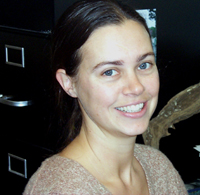A full Gulf recovery must include a transition to clean energy
 Guest post by Chasidy Fisher Hobbs, Emerald Coastkeeper
Guest post by Chasidy Fisher Hobbs, Emerald Coastkeeper
BP has another deepwater rig named Atlantis which, believe it or not, is in even deeper water than Deepwater Horizon and has a similar record. Just short of 6 months after the BP oil disaster, the moratorium on deepwater drilling has been lifted, which means Atlantis and all 30 deepwater drilling rigs are free to carry on with business as usual.
But is this a good idea? Does this mean that all deepwater rigs are now in compliance with current regulations? Will we avoid a similar catastrophe which sent shock waves of ecological and economic destruction throughout the Gulf Coast? We can only wait and see, and hope.
One thing is certain; if such an event were to happen again, tomorrow, we would have the same disastrous "top-down" response with local communities and local knowledge being left out of the planning room. Millions of local citizens willing and able to help would be sent home and fisherfolk would be forced to work for the very company which would ruin their livelihood.
Countless hours and dollars would be wasted putting out booms to keep floating oil off the coastline, while at the same time millions of gallons of toxic dispersants would be used to sink and dissolve the oil, making the booms ineffective and pointless.
The purported reasoning behind using dispersants is to keep oil from impacting shorelines and shore animals. The use is supposedly an "ecological trade-off", sacrificing the deepwater Gulf environment for our coastlines and coastal species. Unfortunately, the process of using dispersants is no trade-off at all, rather an addition of insult to injury. Over the long-term, dispersed oil will negatively impact any species which depends on the Gulf for food, including humans. Dispersants make it much easier for all aquatic species, not just oil eating microbes, to absorb the cancer causing components of the hundreds of millions of gallons of oil left in our Gulf.
BP should have never been allowed to leave dispersed oil in our Gulf and we must insist on a change in the laws to avoid that and a haphazard response/"cleanup" in the future.
If anything good did come from this disaster, it is the increased awareness of just how much our economic health is dependent on our environmental health. Merely the perception of oil blanketed beaches was enough to cause economic destruction statewide, even though we were much luckier than our neighboring Gulf states.
Some folks have been preaching this very idea for years. Regrettably, the sermon typically fell on deaf ears, and we were considered "job hating environmental wackos" by those who have perpetuated a long, drawn out war of economic development versus environmental health.
Will we allow that battle fought on a field of misconceptions to continue? Will we allow this terrible disaster to go by without holding industry and government accountable? Are we so eager to carry on like business as usual that we are unwilling to make the tough choice to reexamine our dependence on fossil fuels and insist on proof of safety rather than assuming safety until we have proof of catastrophe?
We have an immense opportunity to not only avoid a similar disaster, but also to create jobs and stimulate economic development by finally paying proper attention to our air and water.
Creating our current electric grid and transportation infrastructure were by far the greatest historical opportunities for growth in our country. Imagine the possibilities available which wait for us to move out of our comfort zone.
We must not let the lessons learned from BP oil gusher be ignored. A full recovery of the Gulf Coast must include an investment in a clean, renewable energy future.
 Chasidy Fisher Hobbs is a Coastkeeper for Emerald Coastkeeper, a proud member of the Waterkeeper Alliance. She currently serves on the City of Pensacola Environmental Advisory Board and Escambia County Citizens Environmental Committee. Chasidy is also an instructor and advisor in the Environmental Studies Department at University of West Florida and directs the environmental litigation research firm, Geography and Environment.
Chasidy Fisher Hobbs is a Coastkeeper for Emerald Coastkeeper, a proud member of the Waterkeeper Alliance. She currently serves on the City of Pensacola Environmental Advisory Board and Escambia County Citizens Environmental Committee. Chasidy is also an instructor and advisor in the Environmental Studies Department at University of West Florida and directs the environmental litigation research firm, Geography and Environment.
